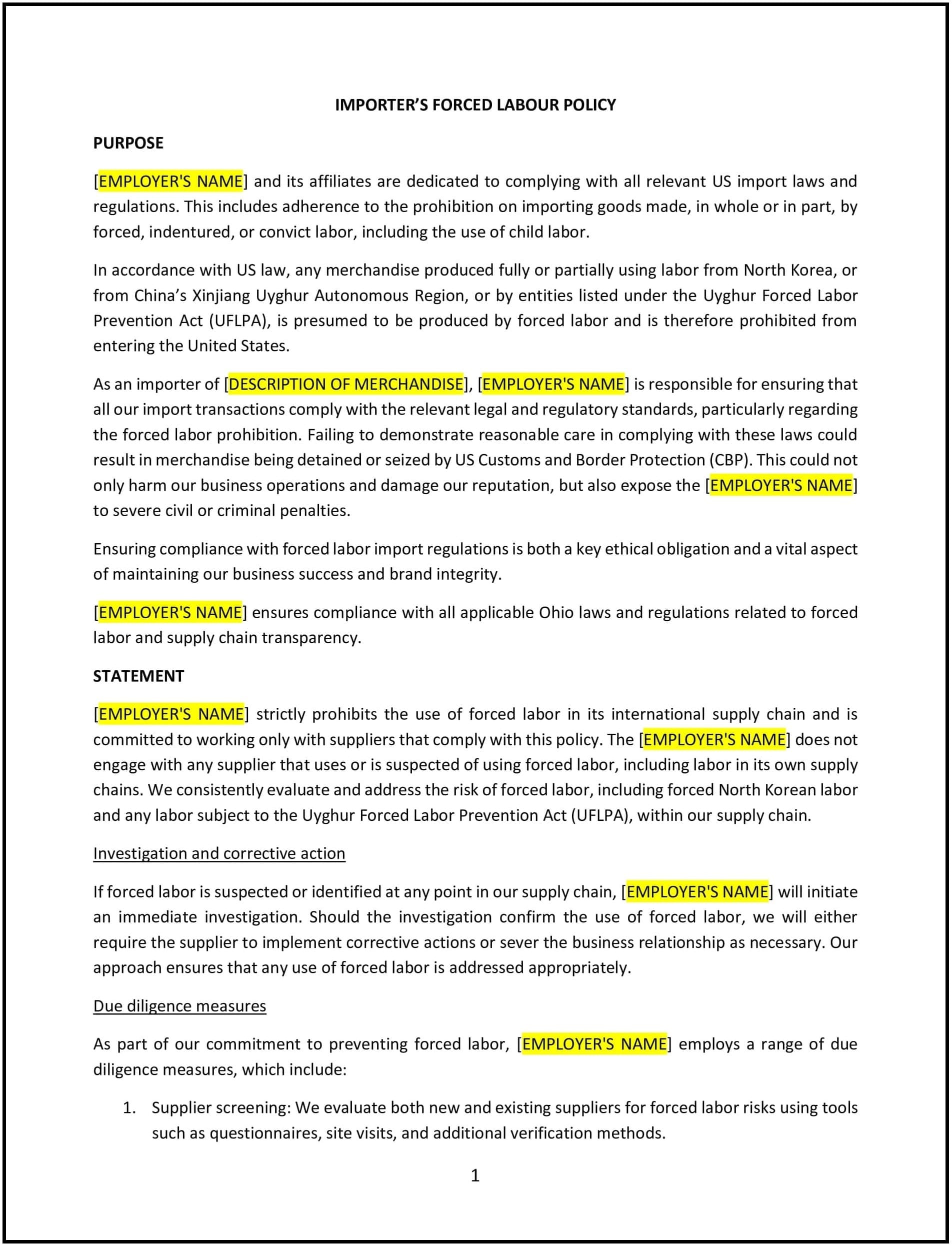Importer's forced labour policy (Ohio): Free template
Got contracts to review? While you're here for policies, let Cobrief make contract review effortless—start your free review now.

Customize this template for free
Importer's forced labor policy (Ohio)
An importer's forced labor policy outlines Ohio businesses' commitment to preventing and addressing the use of forced labor in their supply chains. This policy includes steps for identifying and assessing the risk of forced labor, establishing internal controls, and ensuring that all suppliers comply with legal and ethical standards. It also sets expectations for reporting and responding to suspected instances of forced labor, and outlines the steps the business will take to mitigate such risks.
By implementing this policy, Ohio businesses can uphold human rights, mitigate legal and reputational risks, and ensure their supply chains are free from forced labor.
How to use this importer's forced labor policy (Ohio)
- Define forced labor: The policy should provide a clear definition of forced labor, including coercion, deception, or involuntary servitude, as well as any related illegal practices such as human trafficking or debt bondage.
- Conduct supply chain assessments: The policy should specify how the business will assess the risk of forced labor within its supply chain, including evaluating supplier practices, conducting audits, and requiring documentation of compliance.
- Set expectations for suppliers: The policy should outline the expectations for suppliers, including that they must adhere to the business’s anti-forced labor standards and demonstrate their commitment to these principles. It should specify that all suppliers are expected to certify their compliance with the policy.
- Implement monitoring and due diligence procedures: The policy should describe the procedures for monitoring suppliers and conducting due diligence, including regular audits, site inspections, and third-party evaluations to verify compliance with the forced labor policy.
- Address reporting and remediation: The policy should establish a process for employees and suppliers to report suspected forced labor or violations of the policy, as well as the steps the business will take to investigate and address any violations.
- Outline penalties for non-compliance: The policy should clarify the consequences for suppliers or employees found to be involved in forced labor practices, including potential termination of business relationships and legal action.
- Provide training and awareness programs: The policy should include provisions for training employees, particularly those involved in procurement and supply chain management, to recognize the signs of forced labor and understand how to act when it is suspected.
- Review and update regularly: The policy should be reviewed periodically to ensure it remains effective and aligned with changes in Ohio state laws, federal regulations, and international standards related to forced labor.
Benefits of using this importer's forced labor policy (Ohio)
This policy provides several key benefits for Ohio businesses:
- Mitigates legal risks: By proactively addressing forced labor in its supply chain, the business reduces the risk of legal violations and penalties related to forced labor, human trafficking, and modern slavery.
- Protects the business reputation: Businesses that commit to eliminating forced labor from their supply chains demonstrate their dedication to ethical practices and human rights, which helps maintain a positive public image.
- Promotes ethical supply chain practices: The policy ensures that the business is working with suppliers who share its values and commitment to human rights, helping to build a responsible and sustainable supply chain.
- Increases consumer trust: By adhering to ethical standards and actively addressing forced labor issues, businesses can build trust with consumers who are increasingly concerned about the ethical practices of the companies they support.
- Strengthens supplier relationships: Suppliers that demonstrate compliance with forced labor standards are likely to be more reliable and transparent, leading to stronger, more cooperative relationships.
- Enhances regulatory compliance: The policy ensures the business complies with state and federal regulations, such as the California Transparency in Supply Chains Act, the UK Modern Slavery Act, and other laws governing forced labor in supply chains.
- Contributes to human rights advocacy: By committing to combat forced labor, the business plays a role in advancing human rights and combating modern slavery globally.
Tips for using this importer's forced labor policy (Ohio)
- Communicate the policy clearly: Ensure that all employees, particularly those involved in procurement or supply chain management, are aware of the policy and understand the importance of addressing forced labor within the supply chain.
- Conduct regular audits: Regularly audit suppliers to assess the risk of forced labor and ensure compliance with the policy. The policy should outline how often audits will be conducted and the process for evaluating audit results.
- Work with third-party experts: Collaborate with third-party organizations or experts to conduct independent audits, provide training, or offer guidance on best practices for eliminating forced labor from the supply chain.
- Report findings promptly: Ensure that any instances of forced labor or potential violations are reported promptly to the appropriate authorities and internal teams. The policy should outline the reporting procedures and the steps the business will take in response.
- Offer training: Provide regular training to employees and suppliers on identifying, reporting, and preventing forced labor. This should include educating stakeholders on ethical labor practices and human trafficking.
- Engage with suppliers: Regularly communicate with suppliers to ensure they understand the policy, know how to demonstrate compliance, and feel supported in implementing ethical labor practices throughout their operations.
- Update the policy regularly: Review and update the policy regularly to reflect any changes in Ohio state laws, federal regulations, or international standards on forced labor, and ensure it remains effective in addressing the issue.